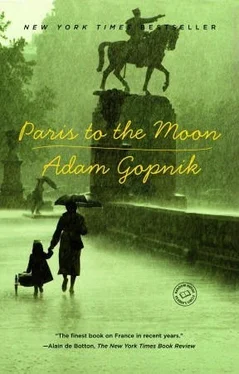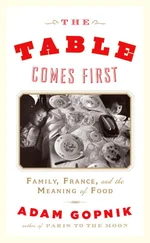I looked for the large in the small, the macro in the micro, the figure in the carpet, and if some big truths passed by, I hope some significant small ones got caught. If there is a fault in reporting, after all, it is not that it is too ephemeral but that it is not ephemeral enough, too quickly concerned with what seems big at the time to see what is small and more likely to linger. It is, I think, the journalists’ vice to believe that all history can instantly be reduced to experience: (“Pierre, an out-of-work pipe fitter in the suburb of Boulougne, is typical of the new class of chômeurs… ”) just as it is the scholar’s vice to believe that all experience can be reduced to history (“The new world capitalist order produced a new class of chômeurs, of whom Pierre, a pipe fitter, was a typical case…”).
What then, the journalist and scholar ask tetchily, what then is exactly the vice of the comic-sentimental essayist? It is of course to believe that all experience and history can be reduced to him, or his near relations, and the only apology I can make is that for him in this case experience and history and life were not so much reduced as all mixed up, and scrambled together, they at least become a subject. The essayist dreams of being a prism, through which other light passes, and fears ending up merely as a mirror, showing the same old face. He has only his Self to show and only himself to blame if it doesn’t show up well.
Even if experience shows no more than itself, it is still worth showing. Experience and history, I think, are actually like the two trains in that Keaton movie where Buster struggles to keep up with the big engine by pumping furiously on a handcar on the adjoining track. It looks as if the little handcar of experience and the big train of history are headed for the same place at the same speed; but in fact the big train is going where it is headed, and those of us in the handcar keep up only by working very hard, for a little while.
There are two kinds of travelers. There is the kind who goes to see what there is to see and sees it, and the kind who has an image in his head and goes out to accomplish it. The first visitor has an easier time, but I think the second visitor sees more. He is constantly comparing what he sees to what he wants, so he sees with his mind, and maybe even with his heart, or tries to. If his peripheral vision gets diminished—so that he quite literally sometimes can’t see what’s coming at him from the suburbs of the place he looks at—his struggle to adjust the country he looks at to the country he has inside him at least keeps him looking. It sometimes blurs, and sometimes sharpens, his eye. My head was filled with pictures of Paris, mostly black and white, and I wanted to be in them.
I am aware that my Paris, which began as a cardboard construction wearing a cape and a kepi, in many respects remains one, an invention, a Bizzaro New York, abstract where New York is specific, intricate where New York is short, though not perhaps more soulful, and that my writing about Paris is very much like my writing about New York in the first five years I lived there.
In fact it would have been a lunchtime’s work for my old friend Eugenio Donato, who haunts this book as he haunts my memories of Paris, to insist that this book about Paris is actually about New York. A lunchtime’s worth of work yet not perhaps a dinner’s worth of truth. The images contain their little truth too, which I grasped even in remnant form in West Philadelphia. We all see our Paris as true, because it is. It is not an old or antiquated Paris that we love, but the persistent, modern material Paris carrying on in a time of postmodern immateriality, when everything seems about to dissolve into pixels. We love Paris not out of “nostalgia” but because we love the look of light on things, as opposed to the look of light from things, the world reduced to images radiating from screens. Paris was the site of the most beautiful commonplace civilization there has ever been: cafes, brasseries, parks, lemons on trays, dappled light on bourgeois boulevards, department stores with skylights, and windows like doors everywhere you look. If it is not so much wounded—all civilizations are that, since history wounds us all—as chastened, and overloud in its own defense, it nonetheless goes on. The persistence of this civilization in the sideshow of postmodern culture is my subject, and the life it continues to have my consolation. I don’t go on a bus in Paris without still expecting my balloon to be barred and the authority figure who oversees it is still a cardboard policeman in a cape. I see the moon these days from Paris because I once saw Paris from the moon.
* * *
My real life in Paris, as in New York, was spent with a few people, and, really, only with two, Martha and Luke, and when I think of Paris, I think of them: Martha and Luke in matching fur hats at the Palais Royal; waiting with Luke in the courtyard of our building for Martha to come down the stairs (in long Russian coat and Tibetan hat, cold girl, in mid-autumn); waiting with Martha in the courtyard of an odd building on the boulevard Raspail for Luke to come from his gym class, peering through the dirty windows and the cagelike grille, one child among many, and then getting a Coca-Cola, five francs from the machine. Cyril Gonnolly once achieved an unearned poetic effect by reciting the names in wartime of hotels on the Left Bank. I can sometimes achieve a similar one, even more unearned, though not less felt, by reciting to myself the names of restaurants where we ate lunch while Luke slept (or, occasionally, where we wished we could sleep, while Luke ate): Le Souffle, Le Basilic, Chez Andre, Le Petit St. Benoit, Laduree. I believe in Le Souffle, on a Saturday afternoon in December, in the back room, with Luke sleeping in his poussette, and the old couple across the neighboring banquette, who had been coming for forty years, there with their small blind dog. The waiters in white coats, the owner in a blue sports jacket, and the smell (aroma is too fancy a word) of mingled cigarettes and orange liqueurs. I am aware that this is what is called sentimental, but then we went to Paris for a sentimental reeducation—I did anyway—even though the sentiments we were instructed in were not the ones we were expecting to learn, which I believe is why they call it an education.
This book is theirs, and I ask them only to share a place at the dedication table with Henry Finder, my first and most patient reader, who had to take what it tasted like on trust.
A bomb went off under my bed the other morning. It was early on a gray Tuesday when I heard a flock of ambulances somewhere near my Left Bank street, making that forlorn, politely insistent two-note bleating all Paris ambulances make. I went downstairs and outside and found—nothing. The street sweeper with the green plastic broom was sweeping; the young woman who keeps the striped-pajama boutique across the street was reading her Paul Auster novel. (“You left New York for Paris ?” she demanded incredulously when I introduced myself not long ago.) Only in the early afternoon, when Le Monde came out, did I realize that the Islamic terrorists who are now working in Paris had left a bomb in an underground train and that, give or take a few hundred yards, it had gone off beneath the second-floor refuge on the Left Bank that my wife and I had found this summer, after a long search. The ambulances were heading for the Gare d’Orsay, where the wounded were being taken.
“Gardez votre sang-froid” is the single, self-sufficient imperative posted on the what-to-do-in-an-emergency placard in the courtyard of our building, and on this occasion people had. The bombings here, though sometimes murderous in their effects, haven’t caused any panic or even much terror. Though Parisians believe they are superior by birth, they do not believe, as Americans do, that they are invulnerable by right. But even if our apartment building had been officially declared the epicenter of the bombing campaign, I don’t think I’d move. Terrorism is part of life, while a nice apartment in Paris is a miracle.
Читать дальше












